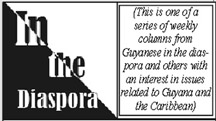Gabrielle Jamela Hosein is a feminist, activist, poet and Lecturer at the University of the West Indies, St. Augustine, Trinidad and Tobago. She also writes a weekly column in the Trinidad and Tobago Guardian newspaper and has a blog, Diary of a Mothering Worker, at https:// grrlscene.wordpress.com/. This piece first appeared in the Trinidad Guardian Newspaper on January 30, 2014.
 Born on November 14, 1913, my father’s mother, Taimoon Hosein, daughter of Kapooran and Shah Mohammed Hosein of Balmain, Couva may have been the first one in the world with this name. It was a misrepresentation of Tayammum, the kind of linguistic and historical mangling that clung to many who crossed water and entered the world in new locations across the British empire.
Born on November 14, 1913, my father’s mother, Taimoon Hosein, daughter of Kapooran and Shah Mohammed Hosein of Balmain, Couva may have been the first one in the world with this name. It was a misrepresentation of Tayammum, the kind of linguistic and historical mangling that clung to many who crossed water and entered the world in new locations across the British empire.
In the year 1946, my grandfather, himself born in 1901 and the son of Sapheeran and Nazar Hosein, went to register the birth of a third daughter. My grandmother wanted to call her Zairee, but my grandfather named her Taimoon, after my grandmother. Disregarding both my grandfather’s ultimate decision and the official certificate, my grandmother called her Zairee anyway and, eventually, so did everyone else in the family.
Such small acts of defiance are the legacy left for young Indian women like me. There were also large acts of insubordination and self-definition in the histories of indentured Indian women who bravely came to Trinidad as independently waged workers, who unapologetically left men who did not satisfy them, who participated in workers’ public resistance, and whose confrontations with inequality led them to be seen as the wrong kind of woman, deserving of shame, punishment and even death.
Indian great-grandmothers had to be pushed hard by the combined forces of Indian men, religious leaders, local planters and British colonial authorities into forgetting decades of increased autonomy so that now we think that they were naturally and always dependent, docile housewives.
I know that narrative is false. So, every time a contemporary mouthpiece of Indian authority, justified by religion, race, a belief in natural gender inequality or some invented history of female obedience, gets upset by Indian women’s choices that they haven’t approved, I’m without fear. We’ve been making decisions about our bodies, our beliefs, our money and our labour for almost 170 years.
Drawing on the history we know and knowing there are stories like my grandmother’s still to be told, I’ve been thinking about what it means to be an Indian feminist in our region. It’s a risky location. On the one hand, we are without authorization by religion, the state or men, whether here, India, the diasporas or even Mecca. On the other, we are aware of how Afrocentrism has dominated woman-issues consciousness, mobilizing and writing in the Caribbean.It isn’t that we don’t draw on all of these connections, it’s that daily-Quran-reading, name-I-chose-insisting grandmothers cannot be entirely understood within or determined by them. Neither can I.
Indian womanhood now is even more complex than three generations ago. Unapologetically, I’m in solidarity with the young Indian lesbians from South, the well-educated Muslim mothers not ready to marry, the young Hindu women who have chosen to terminate pregnancies because of unreliable partners or income, and the girls whose decisions about love may cross racial lines. I’m all for the ‘good’ Indian girls too, whoever and wherever they are.
We all draw on religion, history, ancestry, mythology, cultural diversity, modernity and sisterhoods that cross ethnicity in ways we creatively combine. Regardless of how we choose to weave together our best, most fulfilled, most equal selves, I think it’s our right to decide.
There have been Muslim, Hindu and Christian Indian great-grandmothers and grandmothers, aunts, mothers and sisters who at one or another time agreed. I hear you all nodding quietly as you read. Being a young Indian feminist in the Caribbean is about continuing such resolute negotiations and deciding what to name our own stories.
